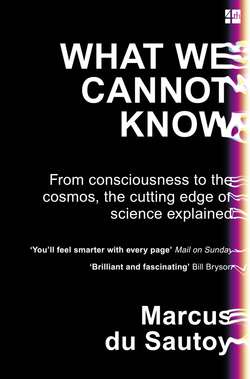Читать книгу What We Cannot Know: Explorations at the Edge of Knowledge - Marcus Sautoy du - Страница 33
WHERE DID WE COME FROM?
ОглавлениеAre there other great unsolved questions of evolutionary biology that might be contenders for things we can never know? For example, why, 542 million years ago, at the beginning of the Cambrian period, was there an explosion of diversity of life on Earth? Before this moment life consisted of single cells that collected into colonies. But over the next 25 million years, a relatively short period on the scale of evolution, there is a rapid diversification of multicellular life that ends up resembling the diversity that we see today. An explanation for this exceptionally fast pace of evolution is still missing. This is in part due to lack of data from that period. Can we ever recover that data, or could this always remain a mystery?
Chaos theory is usually a limiting factor in what we can know about the future. But it can also imply limits on what we can know about the past. We see the results, but deducing the cause means running the equations backwards. Without complete data the same principle applies backwards as forwards. We might find ourselves at two very divergent starting points which can explain very similar outcomes. But we’ll never know which of those origins was ours.
One of the big mysteries in evolutionary biology is how life got going in the first place. The game of life may favour runs of 6s on the roll of the evolutionary dice, but how did the game itself evolve? Estimates have been made for the chances of everything lining up to produce molecules that replicate themselves. In some models of the origins of life it is equivalent to nature having to throw 36 dice and get them all to land on 6. For some this is proof of needing a designer to rig the game. But this is to misunderstand the huge timescale that we are working on.
Miracles do happen … given enough time. Indeed, it would be more striking if we didn’t get these strange anomalies happening. The point is that the anamolies often stick out. They get noticed, while the less exciting rolls of the dice get ignored.
The lottery is a perfect test bed for the occurrence of miracles in a random process. On 6 September 2009 the following six numbers were the winning numbers in the Bulgarian state lottery:
4, 15, 23, 24, 35, 42
Four days later the same six numbers came up again. Incredible, you might think. The government in Bulgaria certainly thought so and ordered an immediate investigation into the possibility of corruption. But what the Bulgarian government failed to take into account is that each week, across the planet, different lotteries are being run. They have been running for decades. If you do the mathematics, it would be more surprising not to see such a seemingly anomalous result.
The same principle applies to the conditions for producing self-replicating molecules in the primeval soup that made up the Earth before life emerged. Mix together plenty of hydrogen, water, carbon dioxide and some other organic gases and subject them to lightning strikes and electromagnetic radiation and already experiments in the lab show the emergence of organic material found only in living things. No one has managed to spontaneously generate anything as extraordinary as DNA in the lab. The chances of that are very small.
But that’s the point, because given the billion billion or so possible planets available in the universe on which to try out this experiment, together with the billion or so years to let the experiment run, it would be more striking if that outside chance of creating something like DNA didn’t happen. Keep rolling 36 dice on a billion billion different planets for a billion years and you’d probably get one roll with all 36 dice showing 6. Once you have a self-replicating molecule it has the means to propagate itself, so you only need to get lucky once to kick off evolution.
Our problem as humans, when it comes to appreciating the chance of a miracle such as life occurring, is that we have not evolved minds able to navigate very large numbers. Probability is therefore something we have little intuition for.
